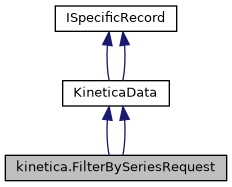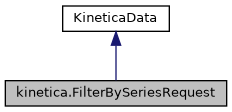A set of parameters for Kinetica.filterBySeries. More...
 Inheritance diagram for kinetica.FilterBySeriesRequest:
Inheritance diagram for kinetica.FilterBySeriesRequest: Collaboration diagram for kinetica.FilterBySeriesRequest:
Collaboration diagram for kinetica.FilterBySeriesRequest:Classes | |
| struct | Options |
| A set of string constants for the parameter options. More... | |
Public Member Functions | |
| FilterBySeriesRequest () | |
| Constructs a FilterBySeriesRequest object with default parameters. More... | |
| FilterBySeriesRequest (string table_name, string view_name, string track_id, IList< string > target_track_ids, IDictionary< string, string > options=null) | |
| Constructs a FilterBySeriesRequest object with the specified parameters. More... | |
| FilterBySeriesRequest () | |
| Constructs a FilterBySeriesRequest object with default parameters. More... | |
| FilterBySeriesRequest (string table_name, string view_name, string track_id, IList< string > target_track_ids, IDictionary< string, string > options=null) | |
| Constructs a FilterBySeriesRequest object with the specified parameters. More... | |
 Public Member Functions inherited from kinetica.KineticaData Public Member Functions inherited from kinetica.KineticaData | |
| KineticaData (KineticaType type) | |
| Constructor from Kinetica Type More... | |
| KineticaData (System.Type type=null) | |
| Default constructor, with optional System.Type More... | |
| object | Get (int fieldPos) |
| Retrieve a specific property from this object More... | |
| void | Put (int fieldPos, object fieldValue) |
| Write a specific property to this object More... | |
| KineticaData (KineticaType type) | |
| Constructor from Kinetica Type More... | |
| KineticaData (System.Type type=null) | |
| Default constructor, with optional System.Type More... | |
| object | Get (int fieldPos) |
| Retrieve a specific property from this object More... | |
| void | Put (int fieldPos, object fieldValue) |
| Write a specific property to this object More... | |
Properties | |
| string | table_name [get, set] |
| Name of the table on which the filter by track operation will be performed, in [schema_name. More... | |
| string | view_name = "" [get, set] |
| If provided, then this will be the name of the view containing the results, in [schema_name. More... | |
| string | track_id [get, set] |
| The ID of the track which will act as the filtering points. More... | |
| IList< string > | target_track_ids = new List<string>() [get, set] |
| Up to one track ID to intersect with the "filter" track. More... | |
| IDictionary< string, string > | options = new Dictionary<string, string>() [get, set] |
| Optional parameters. More... | |
 Properties inherited from kinetica.KineticaData Properties inherited from kinetica.KineticaData | |
| Schema | Schema [get] |
| Avro Schema for this class More... | |
 Properties inherited from Avro.Specific.ISpecificRecord Properties inherited from Avro.Specific.ISpecificRecord | |
| Schema | Schema [get] |
Additional Inherited Members | |
 Static Public Member Functions inherited from kinetica.KineticaData Static Public Member Functions inherited from kinetica.KineticaData | |
| static ? RecordSchema | SchemaFromType (System.Type t, KineticaType? ktype=null) |
| Create an Avro Schema from a System.Type and a KineticaType. More... | |
| static ? RecordSchema | SchemaFromType (System.Type t, KineticaType? ktype=null) |
| Create an Avro Schema from a System.Type and a KineticaType. More... | |
Detailed Description
A set of parameters for Kinetica.filterBySeries.
Filters objects matching all points of the given track (works only on track type data). It allows users to specify a particular track to find all other points in the table that fall within specified ranges (spatial and temporal) of all points of the given track. Additionally, the user can specify another track to see if the two intersect (or go close to each other within the specified ranges). The user also has the flexibility of using different metrics for the spatial distance calculation: Euclidean (flat geometry) or Great Circle (spherical geometry to approximate the Earth's surface distances). The filtered points are stored in a newly created result set. The return value of the function is the number of points in the resultant set (view).
This operation is synchronous, meaning that a response will not be returned until all the objects are fully available.
Definition at line 28 of file FilterBySeries.cs.
Constructor & Destructor Documentation
◆ FilterBySeriesRequest() [1/4]
|
inline |
Constructs a FilterBySeriesRequest object with default parameters.
Definition at line 209 of file FilterBySeries.cs.
◆ FilterBySeriesRequest() [2/4]
|
inline |
Constructs a FilterBySeriesRequest object with the specified parameters.
- Parameters
-
table_name Name of the table on which the filter by track operation will be performed, in [schema_name.]table_name format, using standard name resolution rules. Must be a currently existing table with a track present. view_name If provided, then this will be the name of the view containing the results, in [schema_name.]view_name format, using standard name resolution rules and meeting table naming criteria. Must not be an already existing table or view. The default value is ''. track_id The ID of the track which will act as the filtering points. Must be an existing track within the given table. target_track_ids Up to one track ID to intersect with the "filter" track. If any provided, it must be an valid track ID within the given set. options Optional parameters. - CREATE_TEMP_TABLE: If TRUE, a unique temporary table name will be generated in the sys_temp schema and used in place of view_name . This is always allowed even if the caller does not have permission to create tables. The generated name is returned in QUALIFIED_VIEW_NAME. Supported values: The default value is FALSE.
- COLLECTION_NAME: [DEPRECATED–please specify the containing schema for the view as part of view_name and use Kinetica.createSchema to create the schema if non-existent] Name of a schema for the newly created view. If the schema is non-existent, it will be automatically created.
- SPATIAL_RADIUS: A positive number passed as a string representing the radius of the search area centered around each track point's geospatial coordinates. The value is interpreted in meters. Required parameter. The minimum allowed value is '0'.
- TIME_RADIUS: A positive number passed as a string representing the maximum allowable time difference between the timestamps of a filtered object and the given track's points. The value is interpreted in seconds. Required parameter. The minimum allowed value is '0'.
- SPATIAL_DISTANCE_METRIC: A string representing the coordinate system to use for the spatial search criteria. Acceptable values are 'euclidean' and 'great_circle'. Optional parameter; default is 'euclidean'. Supported values:
Definition at line 313 of file FilterBySeries.cs.
◆ FilterBySeriesRequest() [3/4]
|
inline |
Constructs a FilterBySeriesRequest object with default parameters.
Definition at line 209 of file FilterBySeries.cs.
◆ FilterBySeriesRequest() [4/4]
|
inline |
Constructs a FilterBySeriesRequest object with the specified parameters.
- Parameters
-
table_name Name of the table on which the filter by track operation will be performed, in [schema_name.]table_name format, using standard name resolution rules. Must be a currently existing table with a track present. view_name If provided, then this will be the name of the view containing the results, in [schema_name.]view_name format, using standard name resolution rules and meeting table naming criteria. Must not be an already existing table or view. The default value is ''. track_id The ID of the track which will act as the filtering points. Must be an existing track within the given table. target_track_ids Up to one track ID to intersect with the "filter" track. If any provided, it must be an valid track ID within the given set. options Optional parameters. - CREATE_TEMP_TABLE: If TRUE, a unique temporary table name will be generated in the sys_temp schema and used in place of view_name . This is always allowed even if the caller does not have permission to create tables. The generated name is returned in QUALIFIED_VIEW_NAME. Supported values: The default value is FALSE.
- COLLECTION_NAME: [DEPRECATED–please specify the containing schema for the view as part of view_name and use Kinetica.createSchema to create the schema if non-existent] Name of a schema for the newly created view. If the schema is non-existent, it will be automatically created.
- SPATIAL_RADIUS: A positive number passed as a string representing the radius of the search area centered around each track point's geospatial coordinates. The value is interpreted in meters. Required parameter. The minimum allowed value is '0'.
- TIME_RADIUS: A positive number passed as a string representing the maximum allowable time difference between the timestamps of a filtered object and the given track's points. The value is interpreted in seconds. Required parameter. The minimum allowed value is '0'.
- SPATIAL_DISTANCE_METRIC: A string representing the coordinate system to use for the spatial search criteria. Acceptable values are 'euclidean' and 'great_circle'. Optional parameter; default is 'euclidean'. Supported values:
Definition at line 313 of file FilterBySeries.cs.
Property Documentation
◆ options
|
getset |
Optional parameters.
- CREATE_TEMP_TABLE: If TRUE, a unique temporary table name will be generated in the sys_temp schema and used in place of view_name. This is always allowed even if the caller does not have permission to create tables. The generated name is returned in QUALIFIED_VIEW_NAME. Supported values: The default value is FALSE.
- COLLECTION_NAME: [DEPRECATED–please specify the containing schema for the view as part of view_name and use Kinetica.createSchema to create the schema if non-existent] Name of a schema for the newly created view. If the schema is non-existent, it will be automatically created.
- SPATIAL_RADIUS: A positive number passed as a string representing the radius of the search area centered around each track point's geospatial coordinates. The value is interpreted in meters. Required parameter. The minimum allowed value is '0'.
- TIME_RADIUS: A positive number passed as a string representing the maximum allowable time difference between the timestamps of a filtered object and the given track's points. The value is interpreted in seconds. Required parameter. The minimum allowed value is '0'.
- SPATIAL_DISTANCE_METRIC: A string representing the coordinate system to use for the spatial search criteria. Acceptable values are 'euclidean' and 'great_circle'. Optional parameter; default is 'euclidean'. Supported values:
The default value is an empty Dictionary.
Definition at line 205 of file FilterBySeries.cs.
◆ table_name
|
getset |
Name of the table on which the filter by track operation will be performed, in [schema_name.
]table_name format, using standard name resolution rules.
Must be a currently existing table with a track present.
Definition at line 103 of file FilterBySeries.cs.
◆ target_track_ids
|
getset |
Up to one track ID to intersect with the "filter" track.
If any provided, it must be an valid track ID within the given set.
Definition at line 125 of file FilterBySeries.cs.
◆ track_id
|
getset |
The ID of the track which will act as the filtering points.
Must be an existing track within the given table.
Definition at line 119 of file FilterBySeries.cs.
◆ view_name
|
getset |
If provided, then this will be the name of the view containing the results, in [schema_name.
]view_name format, using standard name resolution rules and meeting table naming criteria.
Must not be an already existing table or view. The default value is ''.
Definition at line 113 of file FilterBySeries.cs.
The documentation for this class was generated from the following file:
- _build/public-os_ubuntu24.04-arch_amd64-cc_gcc_13.3.0/install/Kinetica/Protocol/FilterBySeries.cs


